
The University of North Carolina is the public university system for the state of North Carolina. Overseeing the state's 16 public universities and the NC School of Science and Mathematics, it is commonly referred to as the UNC System to differentiate it from its first campus, UNC-Chapel Hill.

The University of North Carolina at Chapel Hill is a public research university in Chapel Hill, North Carolina. Chartered in 1789, the university first began enrolling students in 1795, making it one of the oldest public universities in the United States.

Orange County is a county located in the Piedmont region of the U.S. state of North Carolina. As of the 2020 census, the population was 148,696. Its county seat is Hillsborough.

Robert Walter "Bob" Scott was an American politician who served as the 67th Governor of North Carolina from 1969 to 1973. He was born and died in Haw River, North Carolina.
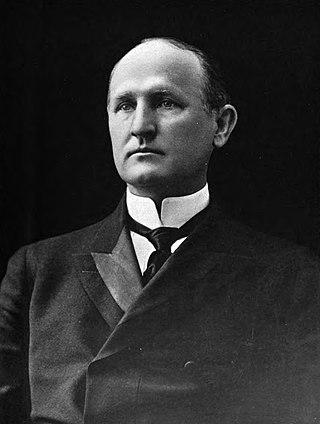
Charles Brantley Aycock was the 50th governor of the U.S. state of North Carolina from 1901 to 1905. After starting his career as a lawyer and teacher, he became active in the Democratic Party during the party's Solid South period, and made his reputation as a prominent segregationist.

Frank Porter Graham was an American educator and political activist. A professor of history, he was elected President of the University of North Carolina at Chapel Hill in 1930, and he later became the first President of the consolidated University of North Carolina system.
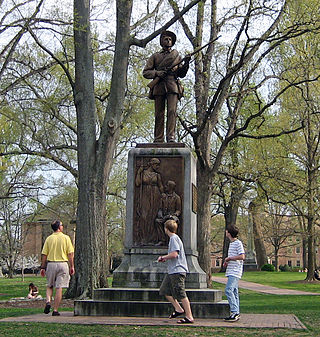
The Confederate Monument, University of North Carolina, commonly known as Silent Sam, is a bronze statue of a Confederate soldier by Canadian sculptor John A. Wilson, which once stood on McCorkle Place of the University of North Carolina at Chapel Hill (UNC) from 1913 until it was pulled down by protestors on August 20, 2018. Its former location has been described as "the front door" of the university and "a position of honor".

The Dialectic and Philanthropic Societies, Inc. commonly known as DiPhi or The Societies, are the original collegiate debating societies at the University of North Carolina at Chapel Hill, and together comprise the oldest student organization at the University, as well as the oldest public student organization in the United States. During the academic year, the Societies hold regular meetings at 7:30 PM on Mondays in the Dialectic Chamber at the top of the New West Building. The Societies also hold occasional social events in the Philanthropic Chamber at the top of New East Building.
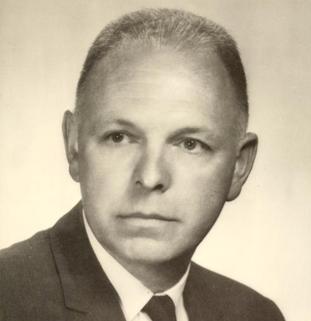
Joseph Carlyle "Lyle" Sitterson was an American educator who served as chancellor of the University of North Carolina at Chapel Hill from February 16, 1966, to January 31, 1972.
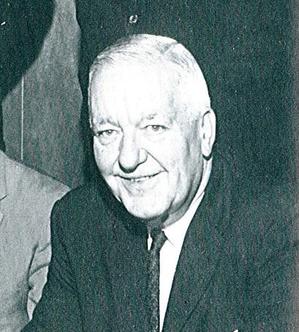
William Gilmore "Bill" Enloe was an American businessman and politician who served as the Mayor of Raleigh, North Carolina from 1957 to 1963. Enloe was born in South Carolina and sold popcorn before moving to North Carolina and taking up work with North Carolina Theatres, Inc. In 1953 he was elected to the City Council of Raleigh. Four years later he was elected Mayor. During his tenure the American South was permeated by civil unrest due to racial segregation. Considered a moderate on civil rights, Enloe criticized black demonstrators and resisted efforts to integrate the theaters he managed, but he eventually compromised and appointed a committee to oversee the desegregation of Raleigh businesses. He left office in 1963, but returned to the city council in 1971. He died the following year. William G. Enloe High School in Raleigh was named in his honor.
William Lindsay Osteen Jr. is a United States district judge of the United States District Court for the Middle District of North Carolina.
Same-sex marriage has been legally recognized in North Carolina since October 10, 2014, when a U.S. District Court judge ruled in General Synod of the United Church of Christ v. Cooper that the state's denial of marriage rights to same-sex couples was unconstitutional. Governor Pat McCrory and Attorney General Roy Cooper had acknowledged that a recent ruling in the Fourth Circuit Court of Appeals and the U.S. Supreme Court's decision not to hear an appeal in that case established the unconstitutionality of North Carolina's ban on same-sex marriage. State legislators sought without success to intervene in lawsuits to defend the state's ban on same-sex marriage.
George Watts Hill was an American banker, hospital administrator and philanthropist who played a key role in the socioeconomic development of Durham, North Carolina, the University of North Carolina at Chapel Hill and the Research Triangle Park. He was also instrumental in health care reform, the desegregation of Durham, the education of children with learning disabilities, and the removal of the Speaker Ban Law.
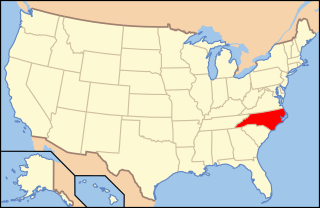
Lesbian, gay, bisexual, and transgender (LGBT) people in the U.S. state of North Carolina may face legal challenges not experienced by non-LGBT residents, or LGBT residents of other states with more liberal laws.
John McNeill (Mac) Smith Jr. (1918–2011) was a North Carolina politician and attorney involved in civil rights advocacy.
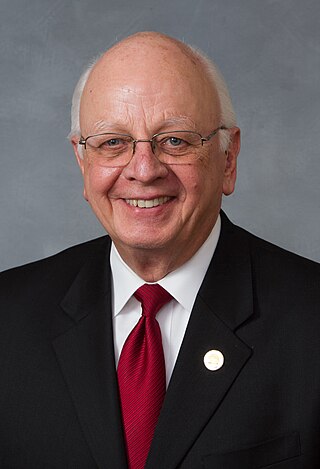
Joseph Aubrey "John" Faircloth Jr. is a Republican member of the North Carolina House of Representatives. He has represented the 62nd district since 2011. The district covers parts of western Guilford County.
Earl Wray Vaughn was an American lawyer, politician and jurist. He served for five terms in the North Carolina House of Representatives, the last as Speaker. He then served for almost sixteen years as a Judge, and later Chief Judge, of the North Carolina Court of Appeals. He was appointed to the North Carolina Supreme Court in 1985, but only served seven months before having to retire due to a sudden diagnosis of terminal lung and brain cancer.

Paul Hardin III was an American academic administrator who spent 27 years as a leader in higher education. He was the chancellor of the University of North Carolina at Chapel Hill from 1988 to 1995, president of Wofford College from 1968 to 1972, of Southern Methodist University from 1972 to 1974, and of Drew University from 1974 to 1988. He was trained as a lawyer at Duke University and at the Duke University Law School.

The Public Facilities Privacy & Security Act, commonly known as House Bill 2 or HB2, was a North Carolina statute passed in March 2016 and signed into law by Governor Pat McCrory. The bill amended state law to preempt any anti-discrimination ordinances passed by local communities and, controversially, compelled schools and state and local government facilities containing single-gender bathrooms to only allow people of the corresponding sex as listed on their birth certificate to use them; it also gave the state exclusive rights to determine the minimum wage.

Thomas Clarence Stone was an American businessman and politician.

















